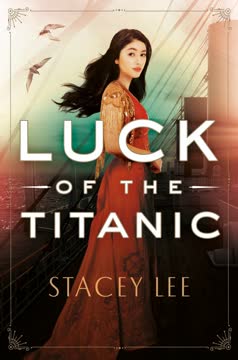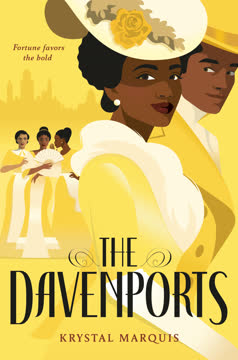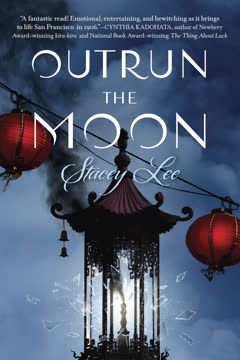Plot Summary
Stowaway on the Gangway
Valora Luck, a British-Chinese teenager, stands on the first-class gangway of the Titanic, determined to reunite with her twin brother Jamie. Denied entry due to the Chinese Exclusion Act and lack of papers, she improvises, stowing away by hiding under a car being loaded as cargo. Her acrobatic skills and quick thinking allow her to slip aboard, but she immediately faces suspicion and must evade detection. The opening sets the tone: Valora's resourcefulness, the weight of exclusion, and her fierce loyalty to family. The Titanic looms as both opportunity and obstacle, a floating microcosm of class and prejudice. Valora's journey is not just across the Atlantic, but through the barriers of race, gender, and fate.
Reunion of Dragon and Phoenix
Valora's first mission is to find Jamie among the third-class passengers. After tense encounters and mistaken doors, she finally spots him on the poop deck, older and changed but still her brother. Their reunion is emotional—Valora's relief clashes with Jamie's shock and wariness. She proposes they pursue their childhood dream: performing as acrobats in America, hoping to impress a circus owner aboard. Jamie, however, is bound by contract and haunted by the realities of exclusion and loss. Their bond is tested by grief for their parents, diverging ambitions, and the new "family" Jamie has found among his Chinese shipmates. The dragon-phoenix symbolism underscores their complementary strengths and the tension between tradition and change.
The Acrobats' Gamble
Valora, undeterred by Jamie's reluctance, proposes a wager: she bets she can earn more money than Jamie and his friend Bo before lights-out. If she wins, Jamie must perform with her for the circus owner; if she loses, she'll return to England. The bet is more than sibling rivalry—it's Valora's way of pulling Jamie back into their shared dream. She enlists the help of two young shipmates, Wink and Olly, teaching them to juggle and perform. The gamble is a microcosm of their larger struggle: risking everything for a chance at belonging and recognition. The tension between hope and pragmatism, and the power of performance to transcend barriers, pulses through this chapter.
Bread Heels and Barriers
Valora's first attempt to earn money is met with both success and humiliation. She juggles bread heels and fruit for a crowd, winning applause and coins, but also the scorn of crew and passengers who see her as an outsider. The Chinese passengers are given burnt bread and the worst seats, a stark reminder of their marginalization. Yet, Valora's resilience and humor turn adversity into opportunity. The bread heels become both literal and symbolic obstacles—hard, inedible, and thrown at those deemed unworthy. The chapter explores how small acts of defiance and creativity can reclaim dignity, even in the face of systemic exclusion.
The Merry Widow's Masquerade
With the help of April Hart, a bold American designer, Valora assumes the identity of the "Merry Widow," occupying a first-class stateroom and donning haute couture. April becomes both ally and co-conspirator, dressing Valora in striking outfits to create a stir among the elite. Valora navigates the world of luxury, hiding her true identity while plotting to retrieve her family's trunk and secure her future. The masquerade is fraught with risk—discovery could mean arrest or deportation—but also offers moments of empowerment and connection. The contrast between first-class opulence and third-class struggle sharpens, as does Valora's sense of self.
Allies in Silk and Smoke
April Hart's friendship and mentorship provide Valora with both practical support and emotional sustenance. April's own outsider status as an American designer in a British world, and her openness about her sexuality, create a bond of mutual understanding. Together, they strategize how to attract the attention of the circus owner, Mr. Stewart, and navigate the social labyrinth of the Titanic. Meanwhile, Valora's interactions with Bo, Jamie's friend, deepen—moving from suspicion to a tentative, charged intimacy. The chapter explores the power of chosen family, the necessity of allies, and the ways in which solidarity can cross lines of class, race, and gender.
Wagers and Wake-Up Drills
As the day of the performance approaches, Valora and Jamie practice their acrobatic routine, rekindling old rhythms and rivalries. Jamie's reluctance gives way to excitement, but old wounds—grief for their parents, guilt, and the scars of poverty—surface. The "wake-up drills" become a metaphor for resilience: the daily discipline that prepares one for moments of crisis. The wager's stakes grow higher, not just for the twins but for their shipmates, who are drawn into the plan. The chapter pulses with anticipation, as the line between play and survival blurs.
The Flying Twins' Challenge
With the help of their friends, Valora and Jamie stage a daring acrobatic show on the docking bridge, drawing a crowd from all classes. Their routine—balancing, leapfrogging, and juggling teacups on a narrow rail—wins thunderous applause and the attention of Mr. Stewart. The performance is both a literal and symbolic crossing of boundaries: between classes, between past and future, between fear and flight. Yet, the triumph is shadowed by sabotage from jealous rivals and the ever-present threat of exposure. The moment crystallizes the novel's themes: the power of spectacle, the longing for recognition, and the precariousness of hope.
Crossing Class Lines
Mr. Stewart offers Valora and Jamie a chance to join the Ringling Brothers Circus, but only if Jamie comes as the "teacher" and Valora as his "wife"—a concession to the gendered and racial barriers of the time. The offer is both a dream fulfilled and a bitter compromise. Jamie hesitates, torn between loyalty to his friends and the pull of a new life. Valora, recognizing the cost of forcing Jamie's hand, proposes an alternative: bringing Wink and Olly as apprentices. The negotiation exposes the limits of merit and the persistence of prejudice, even in moments of apparent victory.
The Circus Opportunity
As the Titanic steams toward New York, Valora, Jamie, and their friends prepare for a future that seems within reach. Yet, tensions simmer: Jamie's ambivalence, Valora's fear of losing her brother, and the uncertainty of their legal status. The promise of America is shadowed by the reality of exclusion and the fragility of dreams. The chapter is suffused with both hope and heartbreak, as the characters confront the possibility that not all of them will make it to the other side together.
Practice, Propellers, and Pride
The twins and their friends rehearse their act, fine-tuning every detail. Old resentments and new alliances surface—Bo's past with Fong, Jamie's guilt over their mother, Valora's struggle to let go. The ship's relentless pace, driven by the ambition of its owners, foreshadows disaster. The chapter is a study in tension: between pride and humility, between the need for control and the inevitability of fate. The Titanic itself becomes a character—magnificent, doomed, and indifferent to the lives it carries.
The Captain's Favor
Valora, in her guise as the Merry Widow, secures the captain's favor for the performance, leveraging her social standing and the support of influential passengers. The encounter is fraught with risk—one misstep could expose her deception. Yet, Valora's wit and courage win the day, and the show is approved. The chapter explores the power of performance, not just on the stage but in the theater of society. The masks we wear can both protect and endanger us.
Rumors, Rivals, and Risks
As the performance draws near, rumors swirl and rivals plot. Skeleton, a predatory steward, grows suspicious of Valora's double life and threatens exposure. The bottom-cutter boys, jealous and resentful, sabotage the act. Yet, the solidarity of Valora's chosen family—April, Bo, Jamie, and the Johnnies—proves stronger. The chapter is a crucible of risk, where trust is tested and alliances are forged in adversity.
The Show on the Docking Bridge
The Flying Twins' performance is a dazzling success, blending danger, artistry, and heart. The crowd is enthralled, and Mr. Stewart is convinced. Yet, at the climax, a rival throws a peanut, nearly causing disaster. Jamie's quick reflexes save the act, and the applause is thunderous. The moment is bittersweet—victory is shadowed by the knowledge that not all obstacles are behind them. The performance becomes a metaphor for survival: balance, trust, and the courage to leap.
Betrayal and Bread Heels
Skeleton's suspicions culminate in violence—he attacks Valora, seeking to blackmail her and steal the money she's earned. She fights back, escaping but is discovered and imprisoned by the ship's master-at-arms. Trapped in darkness, Valora confronts her deepest fears and the limits of her strength. The bread heels, once symbols of resilience, now echo as reminders of the barriers she cannot always overcome. The chapter is a turning point, where survival depends not just on skill but on the mercy of others.
The Night of Ice
The Titanic strikes an iceberg. Panic spreads as the ship begins to sink. Valora is freed by Jamie and their friends, but the chaos of evacuation exposes the brutal realities of class and race. Lifeboats are launched with empty seats, while third-class passengers are locked below. Valora, Jamie, and their friends scramble to find each other and secure a place on a lifeboat. The night is a maelstrom of fear, courage, and heartbreak, as the boundaries between heroism and luck blur.
Sinking Hopes, Rising Water
As the ship founders, Valora and Jamie risk everything to save Wink, Olly, and their friends. They navigate flooded corridors, confront the deaths of companions, and face impossible choices. The water rises, hope sinks, and the line between survival and sacrifice grows thin. The chapter is a meditation on the limits of agency, the randomness of fate, and the bonds that endure even as the world collapses.
Family Saves Family
Valora and Jamie, battered and freezing, cling to debris in the icy Atlantic. They are separated from their friends, forced to choose between their own survival and the lives of others. The mantra "family saves family" echoes as both comfort and curse. In the end, Valora must let Jamie go, trusting that love endures beyond separation. The chapter is a reckoning with grief, guilt, and the meaning of family.
The Last Lifeboats
As the last lifeboats depart, Valora, Jamie, and their friends make desperate bids for survival. Some are saved, others lost. The barriers of class and race persist even in disaster—Chinese passengers are denied seats, women and children are prioritized, and the powerful protect their own. The chapter is a tapestry of farewells: between siblings, friends, and lovers. The Titanic's sinking becomes both an ending and a beginning, a crucible that forges new identities and legacies.
Valor and Virtue's Farewell
Adrift on a piece of debris, Valora and Jamie confront the end. Jamie, succumbing to the cold, urges Valora to look ahead, not behind. Valora, in a final act of love, lets him go, singing the sea shanty that gave them their names. As dawn breaks and rescue arrives, Valora's spirit soars—transformed by loss, but unbroken. The chapter is a meditation on grief, hope, and the courage to fly alone.
Epilogue: Luck and Legacy
In the aftermath, survivors scatter—some to America, others to new lives or old wounds. Jamie writes to Charlotte, reflecting on loss and the promise of reunion. Wink and Olly are adopted, Bo and the Johnnies find their own paths, and Valora's legacy endures in the stories told and the lives touched. The epilogue honors the real Chinese passengers of the Titanic, whose stories were erased by prejudice but reclaimed in fiction. The lesson: luck is not just chance, but the courage to claim one's place in the world.
Characters
Valora Luck
Valora is the heart of the novel—a British-Chinese teenager whose acrobatic skills, quick wit, and relentless drive propel the story. Her relationship with her twin brother Jamie is both anchor and engine, shaped by shared trauma and diverging dreams. Valora's psychological complexity lies in her simultaneous vulnerability and bravado: she is haunted by loss, exclusion, and the fear of abandonment, yet refuses to be defined by them. Her journey is one of self-discovery—learning to let go, to trust others, and to claim her own destiny. Her development is marked by moments of courage, sacrifice, and the bittersweet wisdom that comes from loving deeply in a world that does not always love back.
Jamie Luck
Jamie, Valora's twin, is both her mirror and her foil. Once a gifted acrobat, he has retreated into the anonymity of hard labor, seeking solace in the boiler rooms and the camaraderie of his Chinese shipmates. Jamie is burdened by guilt over his parents' deaths, anger at his father's failures, and the weight of responsibility for his sister. His psychological arc is one of reconciliation: with his past, with Valora, and with himself. Jamie's reluctance to pursue the circus dream is rooted in a desire for stability and belonging, but ultimately, he is drawn back into the orbit of hope and risk. His final acts—saving others, letting Valora go—are both redemptive and tragic.
Bo (Chow Bo Wah)
Bo is Jamie's closest friend and Valora's eventual confidant and love interest. A fireman with a hidden artistic talent, Bo is shaped by loss—his brother's death, his fraught relationship with Fong—and by the need to prove himself in a hostile world. His exterior toughness masks a deep capacity for tenderness and loyalty. Bo's development is subtle: he moves from suspicion to trust, from rivalry to partnership, and from isolation to connection. His relationship with Valora is marked by mutual respect, shared trauma, and the possibility of a future beyond survival.
April Hart
April is an American fashion designer and socialite, whose House of July label becomes both a literal and symbolic vehicle for Valora's transformation. Openly queer and unapologetically ambitious, April navigates the constraints of gender and class with wit and style. Her friendship with Valora is a lifeline, offering both practical support and emotional validation. April's psychological insight and willingness to challenge norms make her a catalyst for change, both in Valora's life and in the broader social fabric of the ship.
Wink
Wink is one of the youngest Chinese shipmates, a runaway with a traumatic past. His nervous tics and self-doubt mask a fierce loyalty and surprising courage. Wink's relationship with Olly is brotherly, marked by teasing, rivalry, and deep affection. His journey is one of healing—finding family, forgiveness, and a sense of worth. Wink's survival is both a testament to his resilience and a tribute to the power of chosen family.
Olly
Olly, Wink's inseparable companion, is quick to laugh, quick to act, and quick to forgive. His optimism and energy provide comic relief and emotional ballast. Olly's longing for security and adventure is channeled into his devotion to Wink and his willingness to follow Valora and Jamie into danger. His development is marked by moments of bravery, vulnerability, and the bittersweet realization that survival often comes at a cost.
Fong
Fong is the oldest of the Chinese shipmates, gruff and suspicious, with a history of loss and betrayal. His antagonism toward Bo is rooted in guilt and unresolved grief over the death of Bo's brother. Fong's arc is one of reluctant transformation: from isolation to acceptance, from bitterness to a measure of peace. His relationship with Tao and the other Johnnies is both a source of conflict and a path to redemption.
Tao
Tao is the spiritual center of the Johnnies, a man who has found enlightenment after a life of hardship. His calm presence, gentle humor, and willingness to sacrifice for others make him a quiet hero. Tao's decision to give up his place in the lifeboats is both tragic and noble, embodying the novel's themes of selflessness and the limits of agency.
Ming Lai
Ming Lai is distinguished by his kindness, his budding romance with a Russian passenger, and his role as a bridge between cultures. His optimism and open-heartedness provide hope in the darkest moments. Ming Lai's survival is a testament to the power of connection and the possibility of new beginnings.
Charlotte Fine
Charlotte is a first-class passenger whose friendship with Jamie and Valora challenges the boundaries of class and race. Her willingness to help, her empathy, and her eventual adoption of Wink and Olly mark her as an agent of change. Charlotte's development is one of awakening—recognizing her own privilege, embracing risk, and choosing solidarity over safety.
Plot Devices
Dual Identity and Masquerade
Valora's double life—stowaway in third class, "Merry Widow" in first—serves as both plot engine and thematic core. The masquerade allows her to cross boundaries, access resources, and challenge the hierarchies of the ship. It also exposes her to constant risk, as discovery could mean ruin. The device underscores the novel's exploration of identity as both fixed and fluid, shaped by circumstance and choice. Performance, both on stage and in society, becomes a means of survival and resistance.
Sibling Rivalry and Wager
The wager between Valora and Jamie is a recurring motif, structuring their relationship and driving the plot. It encapsulates their shared history, their diverging paths, and their mutual need for validation. The wager is both playful and deadly serious—a way to negotiate agency in a world that denies it. It also foreshadows the ultimate gamble of survival, where luck, skill, and sacrifice are inextricably linked.
Class and Racial Barriers
The Titanic's rigid class structure and the pervasive racism of the era are not just background—they are active forces that shape every choice and outcome. From bread heels to lifeboat access, from the Chinese Exclusion Act to the denial of rescue, these barriers are both literal and symbolic. The novel uses them to heighten tension, create conflict, and illuminate the resilience of those who resist.
Foreshadowing and Symbolism
The novel is rich in foreshadowing: the bread heels, the hackle feather, the recurring dreams of drowning and rescue, the references to ice and luck. Symbols—boots named Valor and Virtue, the carved whale, the whirling drum—carry emotional and thematic weight, linking characters across time and space. The use of dreams and omens creates a sense of inevitability, even as the characters struggle to change their fates.
Ensemble Cast and Multiple Perspectives
While Valora is the central narrator, the novel gives voice to a diverse cast of characters, each with their own arc and perspective. The ensemble structure allows for a nuanced exploration of community, solidarity, and the ways in which individual choices ripple outward. The shifting alliances, rivalries, and friendships create a dynamic, living world, where every character matters.
Analysis
Luck of the Titanic is a powerful reimagining of a familiar tragedy, centering voices and experiences too often erased from history. Stacey Lee's novel is both a gripping survival story and a nuanced meditation on identity, belonging, and the costs of exclusion. Through Valora's journey—from stowaway to performer, from sister to survivor—the book interrogates the boundaries of race, class, and gender, exposing the arbitrary lines that determine who is saved and who is left behind. The Titanic becomes a microcosm of society, its sinking a metaphor for the collapse of old certainties and the birth of new possibilities. The novel's greatest strength lies in its refusal to offer easy answers: luck is both random and earned, family is both a source of strength and pain, and survival is both a triumph and a wound. In the end, Luck of the Titanic is a testament to resilience—the courage to leap, the grace to let go, and the wisdom to find hope in the wreckage. Its lessons resonate far beyond the decks of a doomed ship, challenging readers to remember, to resist, and to claim their own place in the story.
Last updated:
Review Summary
Luck of the Titanic received mixed reviews, with praise for its diverse representation and unique perspective on the Titanic's history. Readers appreciated the well-developed characters, especially the protagonist Valora, and the exploration of Chinese passengers' experiences. Many found the story engaging and emotionally impactful, particularly the ending. However, some critics felt the pacing was slow and the plot underdeveloped. Overall, the book was commended for shedding light on an often-overlooked aspect of the Titanic's story and for its compelling sibling relationship.
Similar Books
Download PDF
Download EPUB
.epub digital book format is ideal for reading ebooks on phones, tablets, and e-readers.










